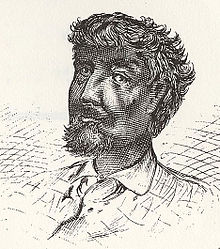JEAN BAPTISTE POINT DUSABLE
Founder of Chicago (1745-1814)
Du Sable was a famous frontier trader, fur trapper, farmer, businessman and the "authenticated father of the nation's second largest city Chicago." Historical records do not agree as to the origin of this great man. However, tradition insists that DuSable was born a free Black, about 1745, in St. Marc, Saint Dominique (Haiti). He was the son of a French mariner and an African-born slave mother. His father took him to France to be educated, and afterwards, he worked as a seaman on his father's ships. He was a powerfully built man, well educated and cultured. He had a love for European art and at one time owned twenty-three old world art treasures. He spoke French, English, Spanish, and several Indian dialects. At the age of 20, DuSable was injured on a voyage to New Orleans.
Upon reaching the shores of New Orleans, he learned that the Spanish government had taken over. The French Jesuits, a Catholic order, protected DuSable from being enslaved until he was well enough to make his way up the Mississippi River. He later settled in Peoria, Illinois. In the early 1770s, DuSable built a cabin and eventually owned more than 800 acres of land in Peoria. He enjoyed a special relationship with the Illinois territorial Indians. He took a Potawatomi Indian, Catherine, as his common-law wife and fathered a daughter, Susanne, and a son, Jean.
Some years later, he left Peoria and made his way north until he reached the Great Lakes area. The promise of greatness of the "Chicago" area, an which DuSable decided to settle, had been passed over by others before him. None had the foresight to look beyond its barren, damp, marshy condition, nor did they have the fortitude to make "nothing" into one of the greatest locations in the western hemisphere. In 1779, starting from scratch, DuSable built the first permanent home on the north bank of the Chicago river, where the present-day Tribune Tower stands. It was a well-constructed house consisting of five rooms and equipped with all the modern conveniences of the times.
Later, despite the disadvantages, DuSable established a thriving trading post and in short time, became well-known as far away as Wisconsin and Detroit. The trading post consisted of a mill, bakehouse, dairy, smokehouse, workshop, poultry house, horse stable, barn and several other smaller buildings. His post was the main supply station for White trappers, and furs to trading posts in Detroit and Canada. DuSable became a man of considerable wealth and means. He also owned a substantial quantity of field and carpentry tools, which indicated that he must have hired men for field work and building assignments. In addition, he owned an appreciable quality of livestock, poultry, and hogs.
In 1784, DuSable brought his wife and children to Chicago. And, as DuSable was a devout Catholic, he and Catherine were properly married by a Catholic priest. In 1796, their grand-daughter became the first child born in the city of Chicago. As the history of DuSable unfolds, it leaves all history scholars puzzled by his sudden departure from such a prosperous environment. On May 7, 1800, the "father" of Chicago sold his entire wealth for a mere $1,200 and left the area. In 1818, he almost died penniless, and was buried in a Catholic cemetery in St. Charles, Missouri.
Revised: July 18, 2013.
